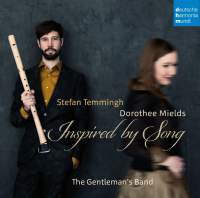Texte paru dans: / Appeared in:
*

International Record Review - (06//2014)
Pour
s'abonner / Subscription information
DHM 88843044582

Code-barres / Barcode : 088843044582
Consultez toutes les évaluations recensées pour ce cd
~~~~ Reach all the evaluations located for this CD
The clever idea behind this programme, devised by recorder player Stefan Temmingh, is set out in the subtitle 'Instrumental variations and baroque ensemble, inspired by early baroque tunes and English Songs'. Just as clever was his choice of the soprano Dorothee Mields as collaborator. While she is best known for her performance of seventeenth and eighteenth century German repertory, she has perfect English and, more importantly, a much better understanding of how to sing early Baroque music than most of the new generation of English singers.
Baroque composers loved writing sets of variations on familiar tunes. The problem today is that we sometimes know the variations but not the original. Two good examples are found in this programme. Anyone who plays or listens to seventeenth century music may be familiar with variations on John come kiss me now by William Byrd, Thomas Baltzar or others; but they may have never heard the original song (I'm not sure I had). The same would apply to Jacob van Eyck's often performed variations (for solo recorder) of Doen Daphne d'over schoone Maeght, which are based on the traditional English song When Daphne did from fair Phoebus fly. Both are delightfully performed on this disc. There is also a lovely treatment of the most famous traditional song of all, Greensleeves, both in its simplest form and with variations for recorder and lute.
The programme includes two of the traditional songs on which Francesco Geminiani composed variations well into the eighteenth century and, on this occasion, I actually enjoyed the songs a little more than the Italian's note‑spinning variations. Of course, British composers and musicians drew more on Continental themes than the other way round. Faronell's Ground from The Division Flute is no less than a classic mid‑seventeenth‑century set of variations on La Follia. It has appeared several times on disc before, though probably not as well played as by Temmingh and friends; but the really interesting work here is the companion piece: a highly political song from the reign of Charles II set to the tune of Farrinel's Ground (sic). The text, delivered with perfect diction by Mields, is a wildly pro‑Tory rant, damning Whigs and other alleged enemies of the King in hilariously vitriolic terms. 'Let Tories guard the King, let Whigs in halters swing' is one of the milder couplets. Extensive footnotes (alas in German only) explain the political references. (The German producers, flatteringly, assume great familiarity with Restoration politics among Anglophone listeners.) The latest music in the programme is a sophisticated arrangement by Frederick Nussen from around 1770 of a song from The Beggar's Opera, Can Love be controul'd by advice?, which, like much of the music in that surprise hit, was a traditional song arranged by Pepusch.
Alongside these rarities, we also get to hear two songs that are the best known of all English compositions of the seventeenth century: Dowland's Flow my tears (followed by Johan Schop's variations played on recorder) and Purcell's 'Dido's Lament'. The former is ravishingly performed by Mields and lutenist Rolf Lislevand. Purcell's tragic ground bass aria, again sung with perfection, is preceded here by an extensive improvisation for Baroque harp by Margret Koell, which, unless I am imagining it, at times prefigures themes from the lament itself. In every sung piece in the programme, Mields judges the mood perfectly: sometimes tragic, more often displaying an infectious sense of fun. Of all the fine music on the disc, it is the silly John come kiss me now that I find running through my head most often.
The launch of this disc was accompanied by a promotional video on YouTube. It is worth having a took because Temmingh is obviously quite a character. Hostile comments posted on other YouTube clips of Temmingh indicate that he is a polarizing figure in the recorder world. I hope no one is deterred by his exuberant personality, because he is not just a showman on the recorder but also a brilliant musician with great instincts. He is just as impressive in serious pieces such as the variations by Schop and van Eyck as in the boisterous John come kiss me now.
The
CD is beautifully produced, with stunningly clear recorded sound and an
expansive and informative booklet essay. Tenuningh is a major new
personality in the Early Music world and Deutsche Harmonia Mundi shows good
sense in signing up him and his ensemble. Of Mields, what more can be
said? If there is a better soprano working in Baroque music right now, I
don't know who it is.
Fermer la fenêtre/Close window
Cliquez l'un ou l'autre
bouton pour découvrir bien d'autres critiques de CD
Click either button for many other reviews


